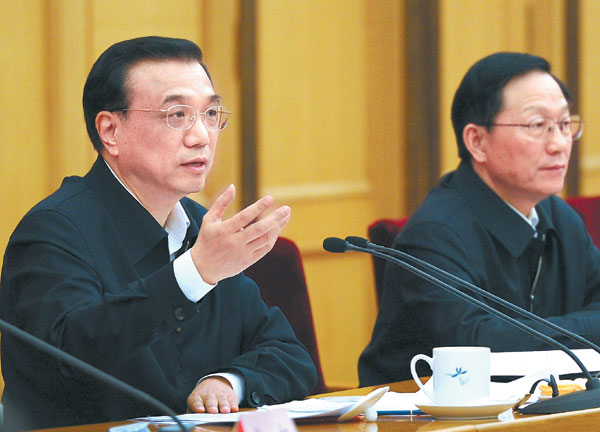Fast growth in fiscal spending to boost economy
Updated: 2011-12-28 07:34
By Wei Tian (China Daily)
|
|||||||||
BEIJING - China will see a faster-growing fiscal expenditure next year, together with moderate scales of fiscal deficit and public debt, to prompt a steady development, Vice-Premier Li Keqiang said on Tuesday.
|
 |
|
Vice-Premier Li Keqiang (L) addresses a budget meeting in Beijing on Tuesday. He said China will see its fiscal spending grow faster to boost economic growth and improve people's livelihood next year. [Photo/Xinhua] |
Li said more priorities should be given to the areas related to improving people's livelihood, so as to boost the domestic demand and consumption.
And the country will also strive to maintain a proper pace of investment and foreign trade growth.
"The positive fiscal policies in the past year allowed a wide margin in the country's policy adjustment but with more global uncertainties ahead next year, the policies need to be more targeted, flexible and forward looking," Li said at a national financial meeting in Beijing.
Li was speaking at the conclusion of the Ministry of Finance's annual working conference, which formulated the details of the fiscal tools that will play a major role in China's economic agenda for next year.
Finance Minister Xie Xuren reiterated at the conference a series of tax cuts the ministry will adopt next year, including lower tariffs on certain imports, value-added tax replacing sales tax, and tax preference toward smaller businesses.
A main part of the plan is the hope of easing the tax burden to boost the development of service sectors and release purchasing power, Li said.
Li, meanwhile, stressed more expenditures should be made in areas such as social security, education and healthcare.
The ministry was allowed enough flexibility to do so as China's fiscal revenue grew more than 26 percent annually to 9.73 trillion yuan ($1.54 trillion) by the end of November.
Fiscal spending is expected to increase 11 percent to 11.1 trillion yuan ($1.75 trillion) in 2012, against a revenue increase of 9 percent, Shanghai Securities Journal reported, citing an unnamed finance ministry source.
Finance Minister Xie vowed to keep the spending on education at no less than 4 percent of the GDP, and to increase the pension level for retirees and medical insurance.
The ministry announced last month that the country will scrap the collection of up to 22 administrative fees from small companies from 2012 to 2014, including charges for companies' registries and tax invoice purchases.
Gao Peiyong, a researcher at the Chinese Academy of Social Sciences, said proactive fiscal policies in 2012 are expected to play a leading role as the country needs to sustain economic growth. And tax cuts are expected to play a more important part than fiscal expenditures next year, Gao said.
To guarantee a smooth implementation of these policies, the central and local administrations need to bring fiscal risks under control, and increase financial openness and transparency, the vice-premier said.










